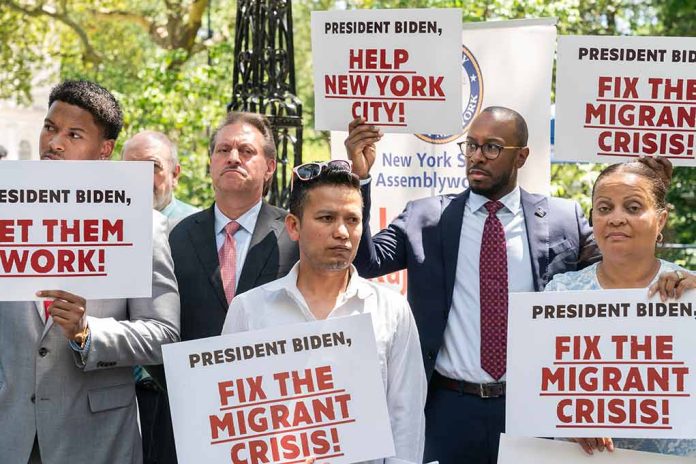
New York City halts its prepaid debit card program for undocumented immigrants under rising political pressure.
At a Glance
- NYC Mayor Eric Adams ends pilot program providing prepaid debit cards to migrant
- families
- Program faced criticism for offering benefits to illegal immigrants over American citizens
- City spent approximately $3.6 million, serving over 2,600 migrant families
- Decision comes as migrant influx decreases and political pressure mounts
Program Origins and Intentions
The prepaid debit card program, initiated by Mayor Eric Adams, aimed to provide essential support to undocumented migrants residing in city-run hotels. The cards enabled families to purchase food instead of relying on city-provided meals, reportedly saving costs while promoting healthier options. The effort was part of a broader attempt to address the economic challenges of accommodating the growing number of migrants. Without renewing the contract with Mobility Capital Finance, the program will come to an end alongside a noted decrease in the migrant population in recent months.
“As we move towards more competitive contracting for asylum seeker programs, we have chosen not to renew the emergency contract for this pilot program once the one-year term concludes,” Adams’ Office said.
Despite its intended benefits, the initiative attracted criticism for allegedly prioritizing resources for migrants over struggling American citizens. Conservative voices amplified these concerns, prompting a reevaluation of the program’s efficacy and fairness. Moreover, the program’s opaque management, employing a no-bid emergency contract with Mobility Capital Finance, sparked further controversy and led to an investigation by the New York City Department of Investigation.
ALERT: New York City Mayor Eric Adams will stop giving prepaid debit cards for food to illegal immigrants. He faced harsh criticism for giving noncitizens a food program that New Yorkers can’t even get. https://t.co/KoPfGl42bU
— HARRISFAULKNER (@HARRISFAULKNER) November 8, 2024
Financial Considerations and Criticism
Spending on the program exceeded $3.6 million, with $3.2 million directed to the debit cards and $400,000 to Mobility Capital Finance. A family of four received approximately $350 per week, with allowances for renewals. Critics lamented potential misuse and preferential treatment for undocumented migrants, although no confirmed cases of fraud or abuse were
reported.
City Comptroller Brad Lander stepped in to revoke the mayor’s ability to extend emergency migrant service contracts without open bidding. This ensures greater accountability and transparency in future initiatives. Meanwhile, recipient affidavits were required to ensure cardholders used the funds appropriately, primarily for purchasing food and essential goods.
Future and Conclusion
With the recent decision to terminate the program, attention turns to how the city will manage its influx of new arrivals in the future. City Hall spokesperson William Fowler indicated that the Adams administration is leaving the door open to similar programs in the future. However, such initiatives will likely face similar scrutiny from both political and public domains especially with President-elect Donald Trump preparing for a return to the White House.
“We will continue to implement and learn from innovative pilot programs like the immediate response cards program as we care for hundreds of new arrivals every week,.” said Fowler.
The closing of this program reflects a dynamic and often contentious rift in how local governments handle immigration issues. As the political climate remains charged, the city may confront new challenges while adapting existing frameworks to remain both humane and efficient.









